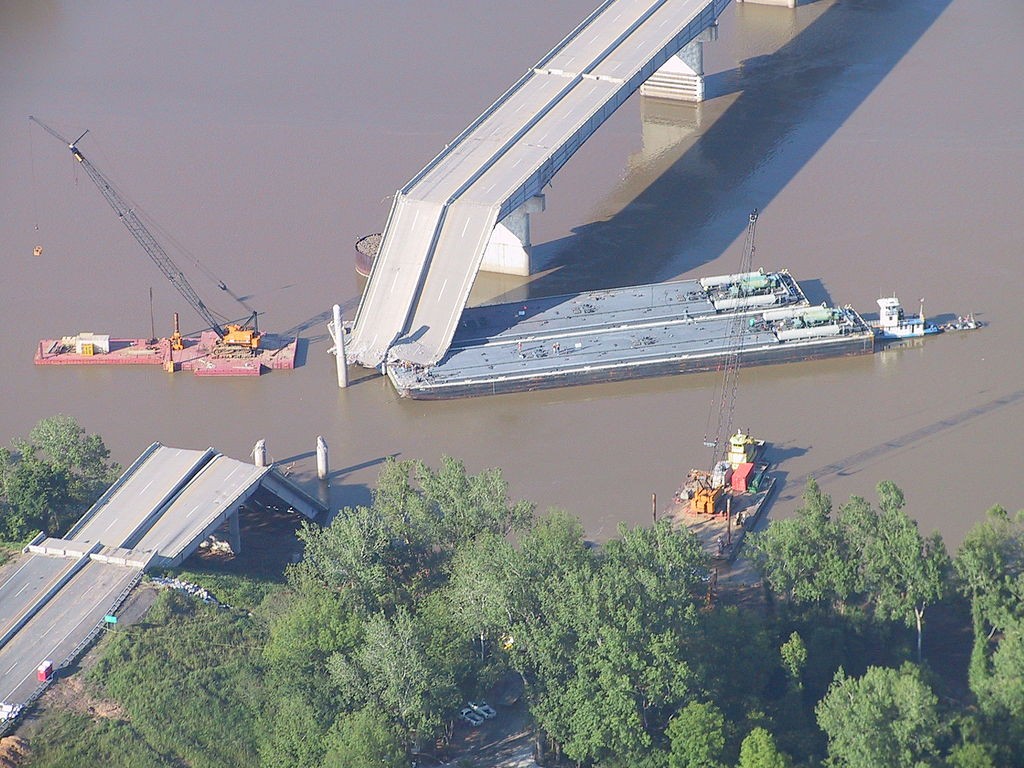When the First Responder is Also a Disaster

On May 26, 2002, the captain of a towboat on the Arkansas River fell prey to a fainting spell, losing control of his rig. The boat slammed into a bridge, causing the mayhem seen above. More than 500 feet of Interstate 40 in Oklahoma toppled into the water below, resulting in the death of fourteen people.
As happens in many disaster situations, the Army comes in to help. In this case, the commander in charge was Captain William James Clark. Captain Clark immediate went into action, taking control of the situation and setting up camp. He directed federal investigators in the recovery of personal effects lost to the water below, coordinated with the Oklahoma governor at the time, and personally contacted the next of kin of some of the deceased. Clark secured a few motel rooms for the first responders, obtained supplies from a local Army surplus store, and convinced a local car dealership to loan his men a pickup truck. These purchases weren’t donations, though. They were backed by the U.S. military — that is, Clark informed these local businesses that the Army would be picking up the bill.
But there was a problem: Clark wasn’t in charge — the Army didn’t send him there. They couldn’t have, because Clark wasn’t even in the Army, and never had been.
He was just a garden-variety fraudster, albeit a temporarily successful one.
There were clues, of course; as the Anchorage Daily News would later note, “the spare tire around his waist is the feature most people remember of his 300-something pound body, and that he has a tendency to lose sentences in his mind before they make it all the way out of his mouth.” But that — and the fact that he wasn’t doing a good job managing the recovery efforts — didn’t seem to be enough to call his authority into question. For two days, Clark was in charge, mismanaging things as any amateur would.
And yet, no one seemed to care. While Clark wasn’t an experienced first responder, he was an experienced fraudster — the bridge imbroglio wasn’t his first time illegally claiming he was someone he wasn’t. (In fact, he had already gone to prison for fraud twice beforehand.) And it wasn’t the last, either; he’d later defraud an Alaskan computer salesperson out of a laptop, claiming he was about to be deployed to Iraq. (He wasn’t.)
While Clark probably could have pulled off the ruse for a while longer, on day three, he decided to instead abscond (with the truck). Once he fled, people began to notice all the clues which, in total, showed that he had no business leading the recovery efforts, to say the least. The manhunt began and, two weeks later, Clark was discovered in Canada. He was deported, arrested, and sentenced to a five-year prison sentence — and forced to pay more than $10,000 in restitution, most of which went to pay for the truck.
The bridge, despite the complications from Clark’s interference, re-opened two months after the collapse, which per NewsOK was not only ten days ahead of schedule, but also in record time.
Bonus fact: The Arkansas River runs from Colorado, through Kansas, then Oklahoma, and finally to Arkansas and into the Mississippi River. Depending on where you are, though, the river’s name is pronounced differently. Per Wikipedia, in Arkansas and Oklahoma, the word “Arkansas” is pronounced the same way the state of Arkansas’ name is (ark-can-saw, basically). But in Colorado and Kansas, many people call it Ark-Kansas.
From the Archives: The Doctor is In, We Think: The story of serial fraudster Ferdinand Waldo Demara.
Related: A big bucket of army men.
